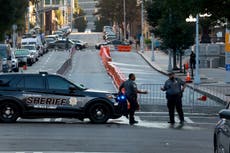Trump wants permission to discuss classified evidence at location where he hoarded classified documents
Mr Trump’s home previously had a facility certified for discussion and storage of classified information
Former president Donald Trump wants permission to discuss classified evidence against him at the location where he allegedly hoarded highly classified information long after his presidency — and his authorisation to possess such information — had come to an end.
In court papers filed in the Southern District of Florida as part of the Espionage Act, conspiracy and obstruction of justice case against the ex-president, Mr Trump’s attorneys have asked Judge Aileen Cannon to let Mr Trump rebuild the Secure Compartmented Information Facility (SCIF) that once existed at his Mar-a-Lago residence so he can discuss classified evidence that the government will use when he and his two co-defendants go on trial next year.
Late last month, prosecutors asked Judge Cannon to enter a protective order barring discussion of any of the classified evidence that will be used against Mr Trump or his co-defendants outside of a secure facility at a Florida courthouse that is staffed by a court employee charged with protecting the classified evidence at issue.
They said Mr Trump’s attorneys’ request to allow him to discuss classified evidence at his office — one of the locations where FBI agents found documents with classification markings during the 8 August 2022 search of the property — would violate US regulations governing the storage and handling of classified information.
They also noted that the ex-president’s “personal residences and offices are not lawful locations for the discussion of classified information, any more than they would be for any private citizen”.
“There is no basis for the defendant’s request that he be given the extraordinary authority to discuss classified information at his residence, and it is particularly striking that he seeks permission to do so in the very location at which he is charged with willfully retaining the documents charged in this case,” they said.
In their response, Mr Trump’s legal team said the ex-president “respectfully requests” to modify the proposed protective order “to approve re-establishment of a secure facility in which President Trump was permitted previously to discuss ... classified information during his term as President of the United States,” and stressed that the proposed Mar-a-Lago facility would not be used to store any classified documents.
They also rejected the government’s claim that Mr Trump’s request is only a matter of convenience. Instead, they said they are making the request “based on the immense practical and logistical hurdles and costs that make it virtually impossible for President Trump to make regular trips to a public facility to discuss classified discovery material with counsel as necessary to conduct a defense consistent with the rights afforded by the Constitution”.
“Both the required security protocol surrounding President Trump’s travel and the challenges surrounding the media’s and public’s intense focus on this prosecution pose an enormous obstacle to our ability to provide counsel to President Trump regarding classified matters, which are, no doubt, essential to this case. Our proposed alternative is both reasonable and appropriate, given the extraordinary and unprecedented circumstances of this case,” they said.
Mr Trump’s attorneys also argued that it is unreasonable to compare the ex-president’s home to an average defendant’s private residence because it is protected by the US Secret Service.
“Limiting any discussions with counsel to the government offered SCIFs is an inappropriate, unnecessary, and unworkable restriction, given the unique circumstances of President Trump’s access to security—namely that he resides and works in a secure location that is protected at all times by members of the United States Secret Service, and that the proposed alternate location previously housed an area approved for not only the discussion, but also the storage and review, of classified information,” they said.
They added that the government’s insistence on the use of a government-owned facility would be “untenable” because it would “make effective communication between counsel and President Trump nearly impossible, and would make appropriate preparation for trial unattainable”.
Join our commenting forum
Join thought-provoking conversations, follow other Independent readers and see their replies
Comments



Bookmark popover
Removed from bookmarks